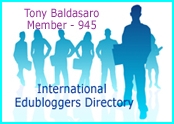I serve two roles in the field of education in the state of New Hampshire. First, I am the Assistant Superintendent of Schools for SAU #16 in Exeter, NH. I am also an administrator at the Virtual Learning Academy Charter School (www.vlacs.org), New Hampshire’s first and only free online school.
I am passionate about learning in a socially interactive manner, engaging students in dynamic student-centric classrooms, evolving as a learning leader, and the Boston Red Sox and New England Patriots. I am married to Kelli, my high school sweetheart and have three children Ben, Beth and Emma. I write and think with the following assumptions:
1. All have the capacity to learn beyond the levels artificially set by the institution of school.
2. In schools, time and resources need to be the variables, not expectations.
3. Collective intelligence is more powerful than singular.
4. We need to prepare our students for a collaborative world, not a competitive one.
5. We are at the beginning of a revolution.
6. Failure should be celebrated, provided that it is unique.
7. Listening is more important than talking.
8. Sometimes in order to lead, one has to follow.
9. In order to learn, vulnerabilities need to be shared.






wow. nice assumptions. esp for a super. esp #2. esp today – #5.
been following you for a while without even coming to your site. glad i finally did.
#6 – such a rich twist – people forget the 2nd part.
#9 – scares the bejeebers out of most.
thank you for all you are doing for ed.
I agree with you. I am a special education teacher and I teach students with autistic spectrum diagnosis. It is time to change the school to meet children’s needs and not vice versa.
Tero,
Thanks for doing what you do! I am often saddened by the amount of changes we ask students to make, yet we don’t look at the changes we need to make as an institution. I often wonder if those kids who are disabled would be disabled in a different learning environment. We have a local charter school which is very popular with special education and atypical learners. When the local school systems disagrees that that charter school is the least restrictive environment and thus cannot guarantee services, parents often opt out of the IEP to enroll their child without strings. Moreover, the students often shine in the new environment.
I don’t offer these comments in an attempt to challenge the special education system and/or claim that students are not educationally disabled, I humbly offer them as an example of where the static institution of school fails in its attempt to educate its students. We need to change the institution (if that’s possible) to fit the students and not the other way around.
Tony – Thanks for coming back to these. The timing is obviously great since we are at the beginning of a New Year (and some people say decade).
In any event, I think that number-one is huge and I am often disappointed that some educators still haven’t adopted it. It is time for these folks to find another field, they are misplaced and misguided.
As I continue to look at the list, I am thinking I would like to adopt it as my own, but 9 is to big a number for me. I would combine a few – I think #5 could be at the top and kind of an over-arching principle.
I feel that six and nine can be combined. We need to admit our weaknesses and failures and show that we are willing to move beyond them. No more – I am not good at this or that!
Seven and eight are also similar in that they are a great reminder that we all have room to grow. I come back to the PLN. Everyone needs to have one and in building once people should make sure that they enlist people that extend their thinking and challenge their beliefs. In fact, I think three and four could fit in for me as well because we are talking about a collaborative culture where there is both give and take by all parties.
I am not sure what I have consolidated the nine assumptions into, but I know that you have hit at the heart of what we need as to be doing in schools. We need to prepare our students to be collaborative thinkers who are not afraid to take risks. This will of course only happen with facilitators (teachers) who believe all kids can learn. I think that if we truly modeled this we would see a revolutionary change.
Finally, I feel that I need to have something about passion-based opportunities incorporated here. I also want to be clear that our assumptions are for learners which includes students and teacher. As you know this is another big shift.
Patrick,
I like a couple of things that you wrote:
1. Less is more. You pushed me toward Daniel Pink’s new book in which he writes about Clair Booth Lewis, who said, “A great man is a sentence.” I’m not sure 9 sentences would meet her criteria. Having said that, I don’t know if I can get it down to one, nor should I. My “sentence” would define who I am, my assumptions would help to define the processes by which I operate.
Having said that, I like the idea of consolidation.
2. Let’s collaborate. These are by no means original thoughts, and as I say in #3, the collective wisdom of many is more powerful than the wisdom of one (especially if I am the “one”).
Thanks for your comments, I look forward to our continued work together.
I like to stretch #1 to All Children can learn, and nearly all at a high level…
That assumption causes educators to continually question current learning results.
Hopefully that will drive #5 ……an education revolution.
Great New Year thinking
Steve,
You’re right. I need to edit #1 – Thanks for your comments.
Tony,
This is a great time for all of us to be questioning our assumptions. Thanks for revisiting your assumptions and asking for feedback. It is helping all of us reflect on our own assumptions and how they impact our daily lives.
I stronly agree with #3 (Collective intelligence is more powerful than singular.). I constantly try to promote a collective wisdom at our school. We recognize that collective wisdom can make better things happen. The whole “two heads (or more) are better than one” philosophy is especially important when we are solving problems and facing the challenges we have in education and our daily lives at school. I also believe that we cannot become a “great” school unless we are able to have a common vision and until we capture our collective wisdom.
I find #4 (We need to prepare our students for a collaborative world, not a competitive one.) our biggest challenge right now. It is so easy to be complacent and do things the way we have always done them. The hardest and more courageous way would be to reconsider every part of our time as school. I hope we can abandon some of the more traditional perspectives and be brave enough to consider learning that is authentic and resembles real life. Our children need experiences that will make them strong collaborators for the future. How can we develoop a collective urgency to redesign learning?
I agree with assumption #8 (Sometimes in order to lead, one has to follow.). I try to lead from behind by sharing my ideas, hopes an dreams for our school. In the end it will be what leadership each person has to give that will serve our learning community.
These three assumptions hit a strong chord with me, but I agree with all of them. I need to think about sharing my own assumptions with others. Thanks for encouraging me to reflect on your assumptions.
All of your assumptions should help teachers improve, but I especially liked #9, “In order to learn, vulnerabilities need to be shared.” To me, this says that teachers need to be able to learn along with their students and not be the all knowing, all seeing oracle. They also must be able to relinquish some control of the classroom so that projects and inquiry can drive learning and not just what they say.
Hi Tony,
Would you like to be added to a distribution list for ISTE news releases? If so, please reply to me with your preferred e-mail address.
Thanks!
-Jay
Jay,
Who is creating this list… what is it for? I won’t be going to ISTE, will that be a problem?
I love all your assumptions, now if only we could have other educators think this way. More power to you sir!